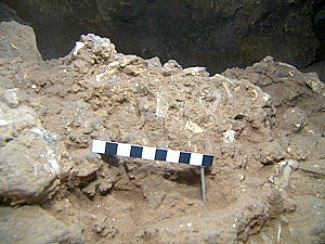UAB to study the most complete Neanderthal skeleton found to date

A group of researchers, including UAB lecturers in Physical Anthropology Eulàlia Subirà and Jordi Ruíz, discovered the most complete Neanderthal skeleton found to date in Spain. The remains, connected anatomically in a remarkable manner, were found during an excavation campaign carried out at the site of Cova Foradà in Oliva, Valencia. After the first research stage, the skeleton will be transferred to UAB laboratories to continue with an anthropological study.
Researchers under the direction of archaeologist José Aparicio, Head of the Archaeological Studies Section of the Valencian local government, highlighted the importance of the discovery due to the preservation of the skeleton - containing all parts from the cranium down to the first sacral vertebra - and because all the joints are still connected.
The skeleton was found in a side layout position to the left within a cemented mass of calcic carbonate formed by the cave's karstic system. Researchers were forced to extract the whole block given the fragility of the bones. Once the remains are separated from the block by the Institute of Human Palaeocology and Social Evolution (IPHES) of Tarragona they will be transferred to UAB laboratories, where Eulàlia Subirà will direct the anthropological studies.
Diggings at the site of Cova Foradà began over thirty years ago. The various excavation campaigns carried out since then indicate that the cave was first inhabited some 100,000 years ago and that it was abandoned between the years 8000 and 9000 BCE. The first Neanderthal remains from the Middle Palaeolithic were found in 2000.
References
Departament de Biologia Animal, de Biologia Vegetal i d'Ecologia. Àrea d'Antropologia Física.

